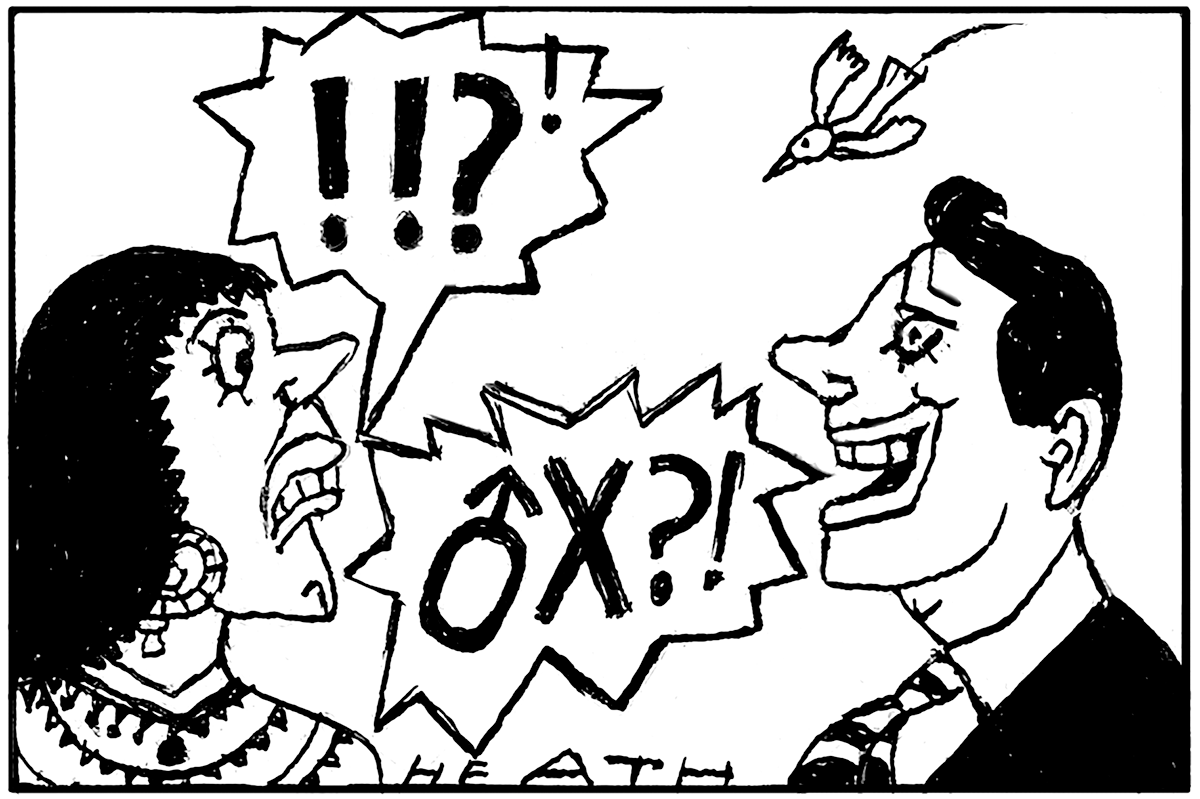Within Silicon Valley, Nick Land is seen almost as a mythic figure. Tech pioneer Marc Andreessen, an official advisor to the White House, lists him as a “patron saint” of his thinking. You may have heard him described as a founding member of the “Dark Enlightenment,” a movement of online right-wingers skeptical of liberal democracy. Land’s name comes up in academic circles, online mythology and Valley folklore. For some, he’s a prophet; for others something more sinister.
“He’s really into demons,” explained Conrad Flynn on a recent Tucker Carlson Show episode about the occult. “Land will talk about being in communication with Satan… the legend around Land is he had been possessed by at least three or four demons.” It makes for a good story, the crypto-fascist Satanist of the tech world.
In conversation, Land is shy. I asked him over Zoom whether he really is an ambassador for the devil. “What I actually mean has nothing to do with horror movies or exorcisms. It’s not like The Exorcist. The question that interests me is: where do thoughts come from? The idea that you have this sealed, internal self that originates all its own thoughts – it’s completely unsustainable. The human subject is not enclosed. It’s porous. It’s an interface.
“So when I use the term ‘possession,’ it’s more philosophical. It’s a way of saying that human thought is always being crossed by external currents, by agencies that don’t originate within the ego. You can call them demons, spirits, daemons, whatever. But the important thing is that we’re not autonomous generators of meaning.”
‘The idea that you have this sealed, internal self that originates all its own thoughts is unsustainable’
The idea isn’t quite as mad as it might originally sound; Socrates spoke of a “daimonion,” a spirit or deity that would guide him. Land seems to be following in that tradition. He was once a philosophy lecturer at Warwick University in England and there cofounded the Cybernetic Culture Research Unit (CCRU) in the 1990s. The CCRU was a short-lived but infamous project that mixed post-structuralist theory, cyberpunk and rave culture into a kind of intellectual fever dream. The group was known for heavy use of amphetamines, which might explain why they developed a theory called “accelerationism.”
The central idea was that there is no alternative to the capitalist machine and that instead of resisting it, the machine should be sped up: that meant deregulation, a scaled-back government and a rejection of everything from conservatism and socialism to environmentalism. Some within this school saw democracy as an impediment. The CCRU were ostensibly Marxists although many have subsequently shifted right.
Land became burned out in the late 1990s and for years nobody was quite sure where he’d gone. He eventually surfaced in Shanghai. Land has described the Chinese fusion of communism and capitalism he found there as “the greatest political engine of social and economic development the world has ever known.”
Now in his sixties, Land looks nothing like the sharp-featured visionary in the few surviving photos from the 1990s.
He recently did a podcast with Aleksandr Dugin, the far-right, “mystical” Russian nationalist sometimes referred to as “Putin’s brain.” During the discussion, Land compared English and Chinese civilizational psychology, concluding that in both traditions, “the best emperor is invisible to society.” When it comes to America, Land says, “everyone should start from the fact that the Founding Fathers were Whigs. The entire American political system grows out of a Whiggish, English, liberal tradition – law, custom, distance, decentralization. It’s a system designed for power that’s invisible, distributed and procedural.
“Trump doesn’t really break from that tradition. What’s new with Trump is theatricality, the sovereign as show. But the background operating system, the bureaucracy, the law, the media – all of that stays in place. The show is a symptom of the hollowness of the center. He’s the noise that reveals the emptiness. So in a way he both rejects and confirms the invisible model: he makes the invisible visible by performing the void.”
Land has suggested in the past that Protestantism and, by extension, the American project, rests on a hidden satanic grammar. The claim is abstruse and involves close reading of John Milton’s Paradise Lost. He argues that Milton’s Satan shaped Protestant ideals of rebellion and self-determination. How?
“It’s complicated. William Blake’s line, ‘Milton was of the Devil’s party without knowing it,’ is obviously right. Milton writes Satan brilliantly and writes God quite badly. That’s just true. But that doesn’t mean Paradise Lost is secretly satanic. The structure of the poem is orthodox. Satan is still the villain. The Founding Fathers would have read it that way. They might have found Satan’s energy inspiring – the rhetoric, the defiance – but still inside a Christian frame. I see it more as a tension inside the English and Protestant tradition. Liberty always carries with it the risk of defiance. That doesn’t mean it’s reducible to Luciferian rebellion.”
We turn to Elon Musk, someone whom Land calls a revealing figure when it comes to Silicon Valley philosophy. Musk has described AI development as “summoning the demon,” warning that AI might destroy humanity. But he also says we probably live in a simulation. How do those two beliefs coexist?
“It’s an extraordinary contradiction. Musk used to be one of the most vocal AI doomers, and he’s also said there’s almost no chance we’re not in a simulation. So he’s saying we must prevent the emergence of the superintelligence that could simulate reality while also saying that superintelligence already exists and we’re living inside it. If both are true, then the question ‘Will AI kill us?’ is already being asked inside a simulation run by AI. The whole thing loops back on itself. It shows how inadequate our moral categories are for the level of weirdness we’re facing.”
I ask him about “Lemurs,” a CCRU theory about entities that haunt the minds of the living. Surely these things must be allegorical? “They’re not metaphors,” he says. “I’m closer to Tucker’s description – ‘time-traveling AIs from the future.’ It sounds dramatic, but that’s roughly the idea. The old distinction between psychology and the supernatural collapses once you drop the myth of the sealed self. Jung’s collective unconscious and the spirit world are really two ways of describing the same thing.
“I often tell the story of a Canadian psychology professor who asked his graduate students to invent a completely fake religion. They knew it was fake; they made it up themselves. They created rituals, symbols, beliefs – the whole thing – and then performed the rituals together. After a while, the students started reporting strange experiences: unexplained coincidences, unsettling phenomena. They were unnerved.
“The point is that people do receive messages from beyond ordinary, secular channels. Those who don’t experience such things usually choose not to. They find the idea absurd or unsettling, and they deliberately tune it out. I’m not saying everyone should devote their attention to communicating with the outside – that would be absurd – but for those who want to, it isn’t difficult. That classroom experiment proved as much. And I’d add that the whole construction of secular history is, at some level, an illusion.”
Land retains some of his Marxist training in peculiar ways. He sees universality – a core concept of liberalism – as inherently Anglo-Protestant. That universality is the result of a history of conquest and domination. “The English didn’t set out to spread humanitarianism. They built trading networks and settlements. Once that’s in place, you have to develop a universalist story to manage it, to hold together all these disparate populations. Universalism is a by-product of empire. And then, over time, it becomes corrosive. The moral framework that once stabilized the system ends up dissolving the cultural foundation that produced it.”
‘Time feels like it’s tightening. The acceleration isn’t progress. It’s a kind of entropy with speed attached’
Immigration is currently tearing England apart. In the US, Trump’s ICE policies are among the most controversial of his second presidency. Those who worry about immigration often talk in terms of the effect it will have on culture. Can the Anglo model of liberalism survive large-scale demographic change? “That’s the big question. Some people think liberalism is universal and can operate anywhere. Others think mass immigration should destroy it. I’m in a smaller, less popular camp. I’m a demographic-reconstruction alarmist because I like liberalism. Historically, liberal societies could absorb diversity, but within limits. The earlier immigrants tended to be self-selected for compatibility – they wanted to live under English norms.
“What’s changed now is that migration has become a political instrument. It’s used to transform liberal societies into something different. Liberalism depends on trust, continuity, procedural respect. You can’t infinitely expand the circle and expect those conditions to persist.”
I ask him about accelerationism, the theory for which he is best known. What can it teach us about the current moment: Trump, the void in the Democratic party, social media algorithms, the flood of AI-generated content? “There’s definitely an apocalyptic atmosphere. You can feel it in every direction – politics, culture, technology. Even cautious people are talking about artificial general intelligence timelines in the range of 2027 now. That would have sounded insane not long ago. So yes, time itself feels like it’s tightening. The acceleration isn’t progress. It’s a kind of entropy with speed attached. The structures are disintegrating faster than anyone can process. Politics has become a performance of breakdown.”
Is he optimistic or pessimistic about the future? “I don’t really think in those terms. Optimism and pessimism are emotional categories that don’t apply here. The interesting questions are about providence and retrocausality. A lot of what I’ve written feels like it came from the future. Sometimes I realize later that there were patterns encoded in the writing I didn’t consciously put there. We don’t control the current. The only agency that remains is alignment – listening to what’s happening and cooperating with it rather than resisting it. You can’t command the process, but you can move with it.”
Xenosystems, a collection of Nick Land’s work from 2013 to 2017 is available now from Passage Press. This article was originally published in The Spectator’s October 27, 2025 World edition.























Leave a Reply